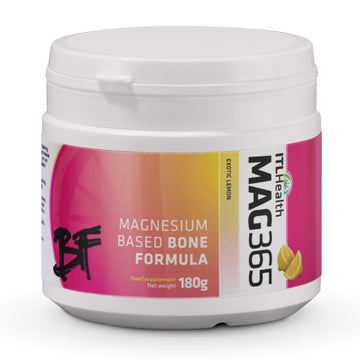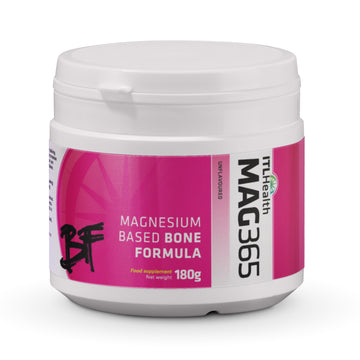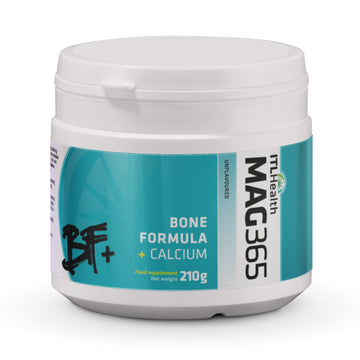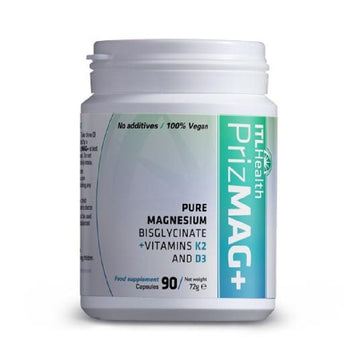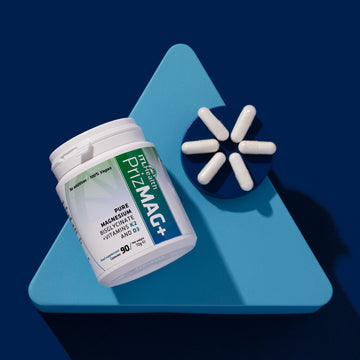We need both calcium and magnesium for optimum health. But did you know these two minerals have an important relationship? We take you through this essential partnership below.
Calcium and Magnesium: An Important Relationship
Calcium and Magnesium: These two minerals are somewhat like the opposite ends of a dimmer switch. Calcium is responsible for giving bones their strength as well as exciting the nervous system, contracting muscles, and contributing to the inflammation necessary to fight invaders or injury. On the other end of the spectrum however, magnesium is essential to provide flexibility in our bones, to prevent them from becoming brittle, and has a necessary calming effect; relaxing nerves and muscles and reducing inflammation.
Calcium is also required in the process of blood clotting so that wounds can heal, while magnesium prevents harmful clots and ensures that oxygenated blood remains flowing.
How to two work together
When we experience a stressful situation, whether it’s an irritable boss, a traffic jam, or a workout at the gym, calcium contributes to the fight-or-flight response that kicks in. Nonetheless, if there is insufficient magnesium available to the body to calm things down, we stay in this heightened stressed state. Such is the Calcium and Magnesium partnership!
Calcium and Magnesium Imbalance
While lack of either mineral is not conducive for health, magnesium is the one likely to fall short because:
- Typically calcium is widely advertised and promoted as an essential nutrient for bone health
- Calcium supplements are frequently recommended by doctors and health care practitioners
- Calcium is fortified in many of our common foods and drink choices
- In comparison, the general public’s awareness of the importance of magnesium isn’t always so prominent. For example, when was the last time you saw an advert on the television promoting food because it is a great source of magnesium?
- The optimum ratio of calcium to magnesium is estimated to be 2:1 from all sources, including food and supplements. But in the average diet is estimated to be 3:1, meaning too much calcium and not enough magnesium.
Calcium from food
The best sources of calcium are dairy products like milk, cheese and yoghurt. However, there are plenty of non-dairy products that are a good source of this mineral such as leafy greens like kale, legumes, tofu and tinned fish like salmon and sardines.
Magnesium from food
Good sources of magnesium include leafy greens, nuts, whole grains, and legumes. As an example, a half-cup of cooked spinach or approx. 28grams of almonds contains about 80 mg of magnesium, which is around 20 percent of the daily minimum recommended amount.
We Recommend:
MAG365 BF
Add 1 teaspoon of MAG365 Bone Formula powder into half a mug of hot/warm water and watch it fizz. This is when the MAG365 Bone Formula activates and predigests to become highly bioavailable to the body so that it is easily absorbed. Top up your mug with some cold water and sip. It is also available in a delicious exotic lemon flavour.
PrizMAG Plus
Alternatively, you can choose our PrizMAG Plus capsules for convenience. This product consists of a pure Magnesium Bisglycinate with added Vitamin D3 and Vitamin K2 – you can take from 1 – 3 capsules daily.
Read more about the many health benefits of magnesium.
Additional Lifestyle Recommendations
1. Keep an eye on your caffeine intake: Tea, coffee, energy drinks and cola drinks all contain caffeine. Large amounts may cause us to excrete calcium in our urine.
2. Be mindful of the amount of alcohol you consume: Excessive alcohol may increase your risk of developing osteoporosis.
3. Maintain a healthy weight: It's important to have a healthy BMI (Body mass index) to protect your bones.
4. Keep active: Exercise is so important for a healthy body and mind. Regular physical activity can strengthen your bones and improve the likes of balance and coordination. Walking is a great option and can be gradually increased daily.
Please note, this blog is for informational purposes only and should not replace medical advice.
It’s always best to consult your doctor before taking any new supplements, treatments or remedies if you are pregnant, breastfeeding or on medication.
Checked and updated: 9 August 2021



